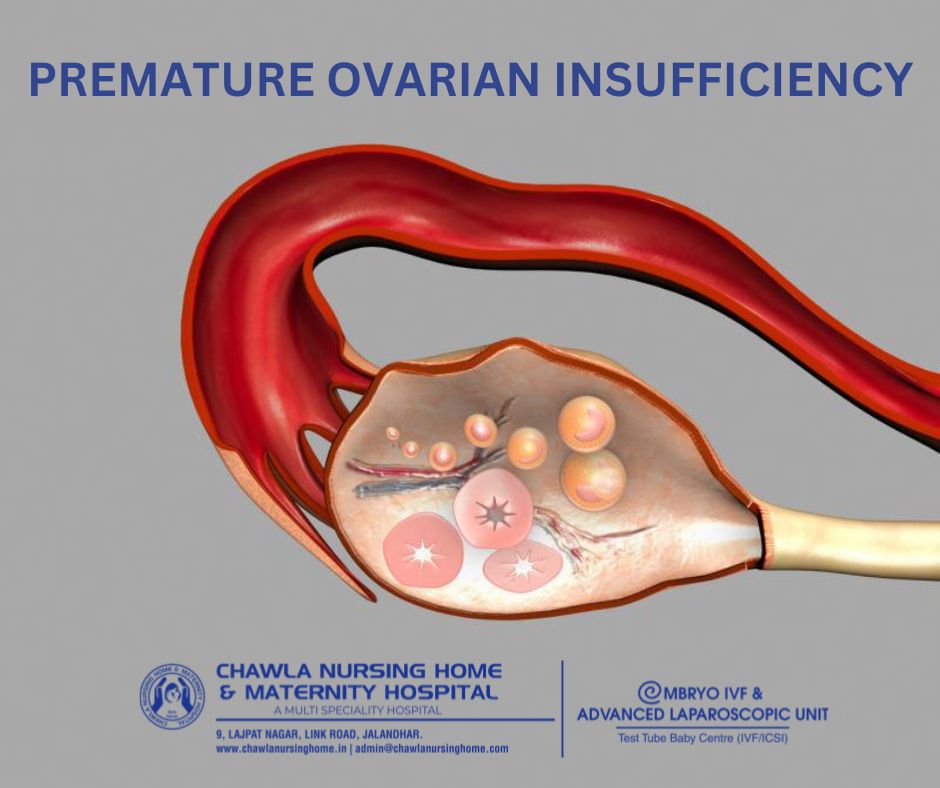
Premature Ovarian Insufficiency: Diagnosis and Treatment Options
Premature Ovarian Insufficiency: Diagnosis and Treatment Options
Premature Ovarian Insufficiency (POI), formerly known as premature ovarian failure, is a condition characterized by the depletion of ovarian follicles before the age of 40, leading to hormonal imbalances and infertility. The ovaries stop releasing the eggs and even stop producing the hormones i.e estrogen, progesterone and testosterone. Early diagnosis is crucial for effective management and improved quality of life for affected individuals. POI is characterised by menstrual disturbance which may be amenorrhea or oligomenorrhea.
Diagnosis: Diagnosing POI involves a combination of clinical history, physical examination, and laboratory tests. The diagnosis is made by evaluating the frequency of periods which is usually over at least four months. The two key hormonal markers used in the diagnosis are Follicle-Stimulating Hormone (FSH) and Anti-Müllerian Hormone (AMH). Elevated FSH levels and decreased AMH levels are indicative of diminished ovarian reserve and are key indicators of POI.
- FSH Levels: In POI, the ovaries fail to respond to the usual negative feedback mechanism, leading to an increase in FSH levels. Elevated FSH levels, especially when tested on different occasions i.e two measurements at least four weeks apart and both the values showing elevated levels of FSH in menopausal range (>40 IU/l) , can be a strong diagnostic clue for POI.
- AMH Levels: Anti-Müllerian Hormone is produced by developing ovarian follicles, and its levels correlate with the ovarian reserve. Reduced AMH levels in conjunction with high FSH levels provide a comprehensive picture of ovarian function.AMH <0.9 hypoestrogenism (estradiol levels<50pg/ml)
Treatment Options: While POI is not completely reversible, several treatment options aim to manage symptoms and enhance the quality of life for affected individuals:
- Hormone Replacement Therapy (HRT): HRT, including estrogen and progesterone, helps alleviate symptoms like hot flashes, vaginal dryness, and bone density loss. It can also be essential for cardiovascular and bone health.
- Fertility Preservation: For those desiring fertility, assisted reproductive technologies such as in vitro fertilization (IVF) or egg donation may be considered.
- Psychological Support: Coping with infertility and the emotional aspects of POI is crucial. Counseling and support groups can play a vital role in addressing the psychological impact of the condition.
Ovarian Rejuvenation and Autologous Bone Marrow-Derived Stem Cell Therapy: Recent research has explored innovative approaches like ovarian rejuvenation and autologous bone marrow-derived stem cell therapy. Ovarian rejuvenation involves techniques to stimulate dormant follicles, potentially restoring ovarian function. Autologous bone marrow-derived stem cell therapy aims to enhance ovarian function by introducing a patient's own stem cells into the ovaries, with the goal of regenerating ovarian tissue.
After the patients consent which will be audiovisual and written bone marrow aspiration is done from iliac crest under local anaesthesia maintaining strict aseptic technique. Prewashed syringe with heparin is taken and aspiration done using jamshidi needle 13g and aspiration done to obtain adequate bone marrow. Once bone marrow derived stem cells are separated using sepax, patient undergoes a laparoscpy under general anaesthesia which is followed by intraovarian instillation of 1 to 2 ml of autologous bone marrow derived stem cells at three to four sites which is done for both the ovaries. Wait for eight weeks , do an ultrasound for follicles in the ovary and AMH levels.
Timely diagnosis of POI through hormonal markers like FSH and AMH is crucial for effective management. Conventional treatments, such as HRT and fertility preservation, play key roles, while approaches like ovarian rejuvenation and stem cell therapy offer hope for the future. Stem cell therapy offers ray of hope to patients who do not wish to opt for donor programme or donor assisted reproductive techniques. For more information contact Chawla nursing home and maternity hospital Jalandhar by calling 9023703001, 7307103001

